- Home
- M. K. Hume
Prophecy: Web of Deceit (Prophecy 3) Page 6
Prophecy: Web of Deceit (Prophecy 3) Read online
Page 6
The child looked up at his tall, dark form with eyes shadowed with a maturity that was far beyond her years. Her hand fell and Myrddion noticed, irrelevantly, that it was the arm that had been scarred by fire.
‘We aren’t safe,’ she whispered sadly. ‘Not safe. He will come!’
The novelty of hearing Willa speak took Myrddion aback. The young healer could recall only a half a dozen instances when she had chosen to express her thoughts beyond a single word, and her vocal cords were rusty from disuse.
‘I’ll protect you, Willa, I promise. Go to sleep now so the night will pass quickly. Thieves and warriors rarely attack at night.’
The child lay down and nestled into the crook of Brangaine’s arm. Feeling the sudden weight, even through the fog of dreams, Brangaine hugged the child closely to her breast and whimpered in her sleep. Willa’s eyes seemed enormous in her small face as she looked up at her master.
‘Please look after my mother, master. Promise me. There’s no saving me, but she’ll mourn for me and I’d not want her to be unhappy.’
Then, as Myrddion gasped like a gaffed fish dragged into the poisonous air, Willa closed her eyes. Within moments she was asleep, and Myrddion felt a deep spasm of pity as the child began to suck her thumb for comfort.
She can’t know anything, Myrddion thought, but he felt an icy finger stir the hairs on the nape of his neck, for an owl suddenly screamed in a nearby thicket. Myrddion shivered in superstition, for the Mother was out hunting and all sensible men found shelter on such nights and barred the door against unseen malice.
The owl shrieked again and Willa stirred in her sleep. Myrddion’s horse shied as he rode towards the stand of trees and the darkness was suddenly filled with rushing wings and long talons.
Verulamium appeared much as Myrddion had imagined it, although he had never visited its stone monuments, wooden towers and graceful marble forum. On the surface, the bustling streets and busy marketplace were untouched by either time or trouble. Only a sharp-eyed stranger would have noticed the absence of mature men and youths in the busy throngs of people on the streets of the town.
‘Uther and Ambrosius have taken the able-bodied men away to fight their wars,’ he said quietly to Cadoc, who nodded in reply. ‘We must buy our supplies and leave as quickly as possible.’
‘The women are wearied from their journey, Myrddion, and they must rest. Bridie won’t complain, but she thinks she’ll lose her milk if she has no opportunity to sleep comfortably. And if you haven’t noticed, Finn, Praxiteles and I haven’t slept for two nights and we’re nearly spent. I don’t know how you keep going: you’ve rested even less than we have, and we’re exhausted. No matter how dangerous the road ahead might be, we’ll be ineffective if we don’t take the time to sleep in a real bed.’
Cadoc rarely complained, being a man who jested easily and understood the necessities of the road. If he counselled breaking their journey, Myrddion was obliged to consider the advice seriously.
On cue, Bridie’s son began to wail thinly and Bridie eased her aching limbs into a more comfortable position before she bared one breast. Myrddion could see the furrows between her eyes and the pouches of violet skin around the sockets that spoke of exhaustion.
‘Very well, friend, perhaps it’s time to find us an inn. But it must be within the walls of Verulamium, for I’d not wish to be caught in the lower town if the Saxons should attack.’
Cadoc nodded in reply, and Myrddion caught the swift twitch of the scarred man’s lips that spoke eloquently of his satisfaction . . . and his relief. ‘Then I’ll follow my nose and find a suitable inn,’ he said, and set the oxen moving to a chorus of creaks and groans from the ill-made wagon.
The Flower Maiden was an inn with an auspicious name from Myrddion’s perspective. Blodeuwedd, the Maid of Flowers and Owls, possessed the dual personality ascribed to so many of his people’s deities, including Grannie Ceridwen, as his grandmother had called the goddess, who was reputed to be an ancestor. Myrddion had never put much credence in this kinship, but the Maid of Flowers and Owls had always captured his imagination. He felt they could dwell under her sign with some impunity, as if the gods were smiling on them.
The innkeeper, Gron, was a cadaverous man who had made a sensible choice when naming his inn, for his namesake had been Blodeuwedd’s lover in the legends. This particular Gron lacked the grace, manners or beauty of the original, however, being in the habit of predicting ruination for the city at the slightest sign of political trouble. Myrddion decided that the man had a jaundiced eye and a pessimistic nature, neither of which traits made for success in his trade. Still, the inn was well sited near the city gates, the beer and wine were good and the food was excellent, courtesy of Gron’s matronly wife Fionnuala, who was as merry as her husband was glum.
The rooms were also a surprise, for they were clean, plain and well ventilated. Despite the presence of an inn cat, a ginger male called Mouser who insisted on twining himself around Myrddion’s legs and pushing himself on the healer’s chest whenever he reclined on the straw-stuffed pallet, the party was very pleased with everything the Flower Maiden had to offer. After a filling meal of mutton stew and fresh vegetables, the party was made comfortable in the two rooms rented for the night and soon fell into the dreamless sleep of the seasoned traveller.
Gron had been eager to accept the healers’ coin, judging by their dress and bright swords that they were men of substance. But long habits of complaint ran deeply in his nature, so he started to whine as soon as the guests had departed to their beds.
‘I don’t trust men with heavy purses and real swords who come from the Londinium road. How are we to know they’re not Saxon spies?’
‘Are you daft, man? When did Saxons wear their hair like Master Myrddion, or have such a crop of freckles as Master Cadoc? If you weren’t such a curmudgeon, you’d admit we’re lucky to have such distinguished guests.’
‘Then it’s to be hoped that their coin is good, Fionnuala, else we’ll have been cheated. And none of that foreign shite either, for I want good British gold!’
‘Ah, man, you’d complain if it rained silver and the rivers were made of gold because you missed the running water.’ Then Fionnuala made her way to her own bed and was soon happily snoring.
Just before dawn, shouts and screams disturbed the inhabitants of the inn. Myrddion woke with an acrid, bitter taste in his mouth from smoke that was billowing into the room through the open shutters. A major fire fanned by the stiff morning breeze was obviously out of control in the town. Cadoc, shaken awake by his master, immediately leaned out of the second-storey window to ascertain the location of the fire, and reported that a red glow in the lightening sky indicated buildings near the southern gate were ablaze.
‘You and Finn stay here with the women, Cadoc,’ Myrddion decided. ‘Praxiteles will come with me to find out what’s amiss. Gods, but I’m glad we’re within the walls, although we’ve seen before that fortifications aren’t always proof of safety. I still remember Tournai.’
‘How could we ever forget that place?’ Cadoc asked unnecessarily. ‘Willa came from that benighted town, but no one was left alive to tell us who she was. Off you go, then, and we’ll stay here to protect the women and children. Don’t forget your satchel.’
Cadoc’s face had a determined set as he hunted up his sword, a weapon he hadn’t used since he was a foot soldier in Vortigern’s army. Placing himself outside their rooms, he prepared to defend the women with his life.
Trusting to the military skills of his companions to keep the women safe, Myrddion snatched up his satchel and followed Praxiteles into the street where the older men of the town were making for the walls. Many of these townsmen carried bows, while the young boys were armed with slingshots and other makeshift weapons that had been snatched from more mundane duties in their homes. One buxom, red-haired wench pushed past Myrddion with a nasty-looking garden hoe slung over one shoulder. Judging by the affronted, martial steeliness in her bro
wn eyes, Myrddion decided that the attackers’ heads would be cloven if she had any say in the matter.
Weaving through the jostling crowd, healer and servant followed the press of townsmen and women towards the southern fortifications. ‘What’s amiss?’ Myrddion asked of a running youth, halting his progress with one hand.
The youth angrily tried to shake him off. ‘The Saxons are burning the lower town outside the gates. They’re slaughtering everything that lives down there – men, women, children and beasts, damn them all.’
‘Then we’d best offer our help, Praxiteles. If the town is taken, then so are we.’
Pushing their way forward, the two men found themselves at the bottom of a flight of open wooden stairs. The wall was built of cyclopean blocks of irregular stone that had been raised to a level some three times the height of a fully grown man, but as they mounted the steps to climb to the ramparts the scene outside the town became visible in all its grisly carnage.
The Saxons had attacked during the pre-dawn light at a time when the denizens of the lower town were still asleep. Consequently, few of the traders were able to seek shelter inside the walls. The gates of Verulamium were closed and barred between dusk and dawn and the gatekeeper had refused to risk the township, or his own skin, by opening the smaller inner doors to save those souls trapped between Saxon weapons and the solid stone defences. With no hope of salvation, the innocent women and children of the lower town pounded on the gates until their fists bled, but were soon cut down by the tall Saxon warriors who continued to pillage the shops, inns and dwellings where the unprotected citizens resided. Once they were finished with a building, the Saxons set it afire, often with the inhabitants trapped inside.
Sickened, Myrddion turned away from the pile of dead flesh below him. Such needless brutality! The healer was familiar with the casual cruelties of war, the fate of non-combatants caught on battlefields and the lack of mercy extended to the wounded and the weak. But, regardless of the blood he had seen spilt in the past, he was still shocked whenever he saw women and children pointlessly slaughtered.
Then the time for reflection was over as the top rungs of a crude ladder thudded against the ramparts. Praxiteles and Myrdion acted without hesitation as they pushed on each of the vertical supports and sent the first Saxon on the ladder tumbling with it to the ground.
Myrddion heard the wicked hiss of stones released from slingshots and watched a huge Saxon collapse in a boneless heap as one of the smooth river stones struck him in the temple. Along the walls, boys took aim at Saxon heads while older men used bows to equally deadly effect. The more able-bodied women and younger men who had not been collected by Uther Pendragon’s levy joined Myrddion and Praxiteles in casting down the crude rope-lashed siege ladders.
The Battle of Verulamium was short and bloody. Just when the sheer weight of Saxon numbers threatened to turn the tide against the town’s defenders, foot soldiers in disciplined phalanxes trotted into the lower township, led by men on large horses who were armed with long, bright swords. Like a deadly killing machine, the new arrivals joined battle with the Saxons, who had no answer to the Celtic use of Roman military tactics. Step by step, the Celts advanced, and although they fought with great personal heroism, the Saxons were driven back until the city wall blocked any further retreat. Then, in vicious, dour, individual contests, the remaining Saxons were cut to pieces. No quarter was asked for – or given.
Above the straining, blood-spattered figures, Myrddion waited with his satchel containing his healer’s equipment slung over his shoulder. Periodically, he patted the smooth old leather to reassure himself that his tools were safe and readily at hand. Knowing that his skills would soon be needed for friend and foe alike, he crisply ordered Praxiteles to return to the Flower Maiden with instructions to send Cadoc and Finn to him with all the equipment necessary to save whatever wounded survived in the stew of bodies that lay at the foot of the walls.
Finally, as the sun began to rise over the smoking ruins of the lower town, Myrddion could see the full horror of the attack in the merciless clarity of day. The bodies of dead and dying Saxon warriors lay over the corpses of the citizens who had been massacred against the city walls. Even this early in the day, ruddy shafts of sunlight reflected off bloodied blades and spear points as wounded barbarians were summarily executed. This exercise in cold-blooded slaughter might have been expedient for Ambrosius’s commanders, but the stain on the Celtic standard shamed Myrddion.
The commander of Ambrosius’s forces trotted his horse to the gates, driving the unwilling beast over the heaped bodies of the dead without compunction for either friend or foe, until he could use the pommel of his sword to batter at the wooden barricade and demand entrance. As the warrior removed his plumed helmet to wipe his sweating forehead with his mailed arm, Myrddion recognised the wildly curling, ruddy hair of Uther Pendragon, and his heart sank with dismay. Viewed from above and ignorant of Myrddion’s careful scrutiny, Uther cut a reckless, brutal figure, and the healer remembered how frightened he had been when he’d treated Prince Uther’s wound outside Londinium six years earlier.
The prince’s arms were thick with clotting blood to the elbows, so that any watcher could imagine that he had sunk both hands and forearms into a river of gore. His sword was so filthy with mud, brain matter and drying blood that no light reflected off it. Blood spatter marked Uther’s whole body, except for where his helmet had protected his face. A further band across his eyes and the bridge of his nose, which had been uncovered, was stippled with red, matting his golden eyebrows and staining the creases around his pale eyes. He looked like a bleeding gladiator or a monster out of legend whose sole purpose was to bring death to mankind.
Then, just as Myrddion began to turn away, Uther looked upward into the morning light and his hard blue eyes fell upon the healer, who was little more than a dark shape looking down on him. The prince’s brows narrowed with perplexity for a moment as he searched through his memory for this shadowy face, outlined by the last of the fires, but then the machine-like brain recognised the healer and Ambrosius’s brother raised his blade in an ironic salute.
As Myrddion flinched away in alarm, the gates were thrust open and Uther applied his spurs to his horse’s flanks. The startled creature leapt forward into Verulamium.
Myrddion shuddered. As clearly as if it had been yesterday, he heard again the prince’s mocking words as Myrddion finished dressing his wound, six years before: ‘When you return from your journey to Constantinople, I would have one of the finest healers in the land as my personal physician.’ If Uther remembers me, he’ll have me ordered to Venta Belgarum with no hope of refusal. I’ve travelled thousands of miles to avoid having a master, only to be betrayed by fate once I arrive home.
But Myrddion did not complain aloud. Men such as Uther Pendragon purchase sharp ears and eyes everywhere, so any criticism would certainly be repeated to the High King’s brother. The reckoning that followed would be bloody and swift.
And so Uther’s force secured Verulamium, and as his warriors executed the last of the Saxon wounded, the crows and ravens began to mass in the nearby woods. The birds were hungry, but like all scavengers they were prepared to wait. When armed men set the dawn ablaze, the meat-eaters knew that they would soon dine well.
THE FAMILY TREE OF UTHER PENDRAGON
THE FAMILY TREE OF KING GORLOIS OF CORNWALL
The information above is culled from Geoffrey of Monmouth’s work, The History of the Kings of Britain. Other historical sources include Wace, Layamon, Gildas, Nennius and John Rhys.
CHAPTER III
AN UNWILLING SERVANT
Three things always threaten a man;
Sickness or age or the shock of quick death
Will snatch the soul from the strongest warrior
Thus has he need, who treasures his name,
The praise of his people after his parting,
To daunt the devil before his departing,
Do well on earth
and worthily conquer.
From a very old English poem, The Soul’s Voyage
‘Shite!’ Myrddion swore crudely while Cadoc and Finn stared at him askance. ‘I know Uther Pendragon saw me. I know it! I saw his eyes try to place me in his memory. Damn and shite!’
‘Perhaps you need to rejoin the women, master. Surely he won’t search too hard for you if he can’t find you among the wounded.’ Cadoc wasn’t convinced by his own argument, whatever platitudes his mouth might utter.
Myrddion wasn’t convinced either, knowing full well that Uther Pendragon had a mind that was wholly focused on achieving his personal ends and fanatically fixed on the destruction of his enemies. By Uther’s reasoning, Myrddion would serve to keep his warriors alive and fighting: ergo, Myrddion must be forced to accede to Pendragon’s wishes.
‘Finn, listen to me. Have you and Bridie discussed what I said to her? If Uther Pendragon decides to demand my services, I’ll try to ensure that you are free to continue on to Segontium. If Annwynn is still alive, she will take your family into her household and give you a good life in exchange for your skills. But if she has already passed to the shades in our absence, you should seek out Eddius, my grandmother’s husband. He will ensure that you and yours are kept safe.’
The healers had reached the gate and found the bodies stacked three high as Uther’s warriors stripped the dead of any wealth they possessed. A crude cart drawn by a complaining mule was brought as close to the carnage as possible and, once naked, the enemy dead were flung unceremoniously into its depths like so much rubbish.

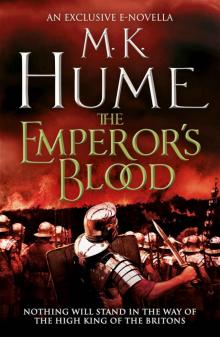 The Emperor's Blood (e-novella)
The Emperor's Blood (e-novella)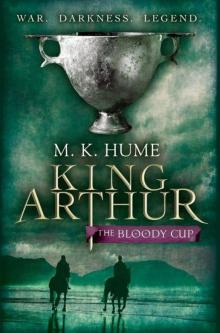 King Arthur: The Bloody Cup: Book Three
King Arthur: The Bloody Cup: Book Three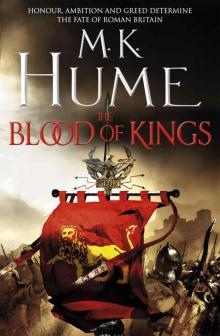 The Blood of Kings: Tintagel Book I
The Blood of Kings: Tintagel Book I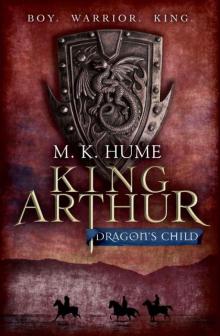 King Arthur: Dragon's Child: Book One (King Arthur Trilogy 1)
King Arthur: Dragon's Child: Book One (King Arthur Trilogy 1)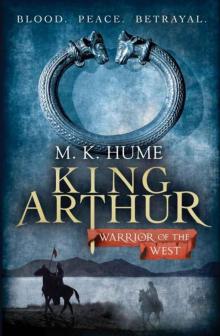 King Arthur: Warrior of the West: Book Two
King Arthur: Warrior of the West: Book Two The Storm Lord
The Storm Lord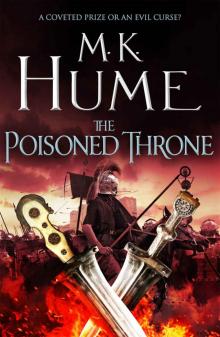 The Poisoned Throne: Tintagel Book II
The Poisoned Throne: Tintagel Book II![M. K. Hume [King Arthur Trilogy 04] The Last Dragon Read online](http://i1.bookreadfree.com/i2/04/07/m_k_hume_king_arthur_trilogy_04_the_last_dragon_preview.jpg) M. K. Hume [King Arthur Trilogy 04] The Last Dragon
M. K. Hume [King Arthur Trilogy 04] The Last Dragon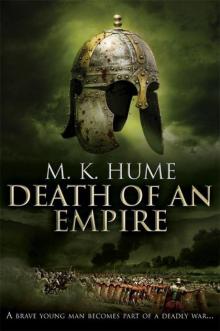 Prophecy: Death of an Empire: Book Two (Prophecy Trilogy)
Prophecy: Death of an Empire: Book Two (Prophecy Trilogy)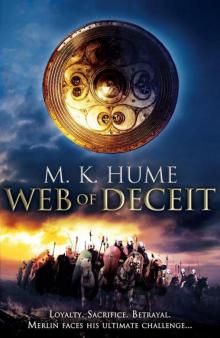 Prophecy: Web of Deceit (Prophecy 3)
Prophecy: Web of Deceit (Prophecy 3)